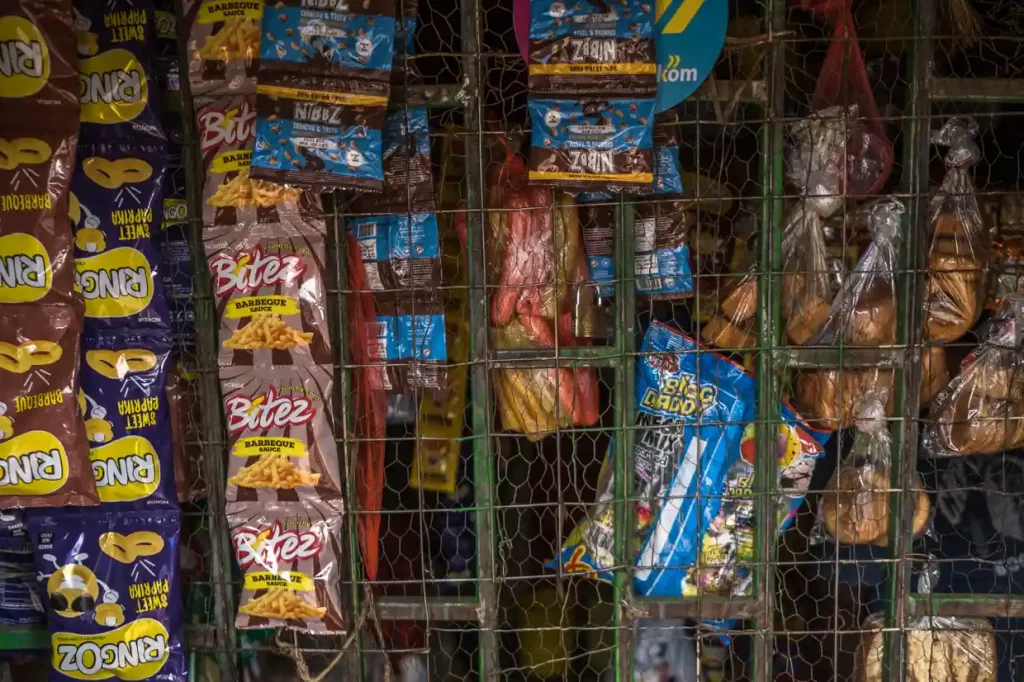Beef News Today Harm to Health Guardian

- Obesity is a growing worldwide trend. In Kenya, over a 1000000 five to xix-yr-olds will be obese past 2030. Kenyan doctors are diagnosing increasingly younger people with noncommunicable diseases such as diabetes.
- At the same fourth dimension, the East African nation is likewise stalked by hunger. More than than three million people don't have easy access to good nutritious nutrient.
- Run across the children at the forefront of a movement towards healthy food choices – one taekwondo class at a time .
The children of Bees Haven kindergarten are about xv minutes into their weekly taekwondo class when their instructor has some stern words for them. "You guys are not panting," says Lizzanne Adhiambo, with a grin. "I want to see the power! Let'southward punch!"
Aside from a certain amount of confusion over left and right hands, Adhiambo'due south pupils obey. With alternating arms they punch out in front of them, 15 four- to six-year-olds, wearing white grooming uniforms, shouting "Aye!" as the instructor counts from 1 to ten.
"They dear it so much," says Beryl Itindi, manager of the pre-primary school in Syokimau, on the south-western outskirts of Nairobi.
After class, the children sit downward for lunch of beef stew, leafy greens, ugali – maize flour porridge – and fresh fruit. "Thank yous for our nutrient and our many blessings," they chorus. "Amen."
These children are at the forefront of new efforts to foster lifelong habits of exercise and healthy eating – and stave off a foe increasingly visible in Kenya's towns and cities: obesity.

Equally in much of Africa, the number of people classed as obese in Kenya is on the ascent: by 2030, the Globe Obesity Atlas says 1.4-meg v to 19-yr-olds will be obese. The World Health System (WHO) considers a person with a body mass index (BMI) over 25 to be overweight, while a BMI over 30 is obese.
A 2015 survey – the well-nigh recent undertaken – found 20% of Kenyan men and more than 50% of women were either overweight or obese.
In a report last year, Kenya'southward government recognised obesity as a major take chances cistron for noncommunicable diseases (NCDs) such as diabetes and cancer, which are responsible for 39% of deaths in Republic of kenya – upwardly from 27% in 2014.
"The statistics show that obesity is growing at a very alarming charge per unit, non just in Republic of kenya but in the region and world," says Stephen Kimutai Tanui, strategy manager for Wellness for Greatness, the arrangement behind the taekwondo classes.
The education the grouping is giving children was sorely lacking when Tanui, 32, was a child: "Nosotros were non told that physical activity has very many benefits … not merely to enjoyment and functioning in school but to our health."
In a country stalked by hunger and where more than iii meg people are classed as acutely food insecure, the priority was getting plenty food, irrespective of its nutritional value, he says.
"When nosotros were immature, that link between good diet and skillful health was missing," says Tanui. "In Kenya and in nearly African countries we have a trouble with malnutrition, and that'southward what everyone focuses on. People should have nutrient, only nosotros should besides focus on getting good and salubrious foods, because the rates at which obesity is growing, they are going hand in hand: malnutrition and obesity. Information technology's a terrible burden."
In parts of the rural north and east, the worst drought for forty years is driving thousands of Kenyans from their homes. According to the International Federation of the Carmine Cantankerous, approximately 755 000 children under five volition be acutely malnourished throughout 2022.
In Nairobi, where fast nutrient chains such equally KFC, Burger Rex and Domino'south stand on every other street corner, and billboards push "vitamin-enriched" chocolate drinks to motorists on the heaving roads, the problem is "completely different" says Dr Davis Ombui, a diabetologist. "People become to jobs in the forenoon, get into [the] function, get back into their cars, get home. They don't walk to piece of work as much, and fast nutrient is at present a big affair in Nairobi."
The consequence is articulate at his private clinic surgeries. "We are seeing younger and younger people diagnosed at a younger age. Today I had someone who was 21. Type 2 diabetes. Information technology's all because of obesity; all because of the lifestyle."
Terminal year the ministry of health published a strategic plan to respond to its "epidemiological transition" in disease burden from infectious disease, such equally malaria and tuberculosis, to the rising burden of NCDs. It recognised obesity as a major risk cistron, merely doctors fright there is little physical activity.
"You might find these policies are there on paper," says Ombui. "Simply no one is translating that into action on the ground. I'm sure if you lot go to the cabinet you'll find actually nice policy papers that were sponsored past WHO and [other] organisations – just gathering dust."
The health ministry building was approached for comment. The government'southward target is to reduce obesity prevalence from 28% in 2020 to 26% in 2025, and the clock is ticking. By 2030, NCD deaths are expected to increase by 55%.
And in that location remains a lingering association in society betwixt backlog fat and material success.
"Yous find immature people at university want to add weight and grow a abdomen as a status symbol. It'due south that bad," says Stephen Ogweno, CEO of Stowelink, a youth-led enterprise aimed at combating NCDs. "There is still this perception that needs to change."
For well-off Kenyans, Dr Wyckliffe Kaisha has the answer. I of the few surgeons in the country to perform bariatric – or weight loss – surgery such equally gastric bypasses, he has seen a meaning increase in patients, partly due to COVID-xix, which alerted more than people to the ramifications of obesity, diabetes and hypertension.
Ane of his patients, a 29-year-old who concluding year had a sleeve gastrectomy – involving removing part of her stomach – has no regrets.
"It requires somebody to be psychologically and emotionally prepared considering it is not easy, especially if you're used to taking a lot of junk [food]. I actually loved chips. Present I can't even stand the olfactory property of chips," she says.

The woman, who does not want her name published, says she has lost 40kg: "At least now I can walk up stairs. I don't have to depend on lifts."
Bariatric surgery has its critics, but Kaisha insists it is beneficial for the vast majority. His bugbear is with insurers, who refuse to cover the procedure, meaning only the wealthy can afford his $v 000 (R77 500) charges.
He has told insurers that bariatric surgery is cost-constructive as it prevents conditions developing. "They still turn down it and say information technology is cosmetic surgery. But it is not at all," he says.
The village of Njathaini, on the northern outskirts of Nairobi, is a world away from Kaisha's clientele. With loftier unemployment and fiddling dispensable income, it is in places like this that intervention is urgent, says Ogweno.
Cheers to genetics, diet and lack of practice, Ogweno, 26, in one case weighed almost 127kg. Driven by wanting to "look like Dwayne 'The Rock' Johnson" he lost weight at university and competed in Mr Fitness contests.
He wants to show that obesity, diabetes and cancer don't simply affect "the old and the rich." What he and his colleagues institute in Njathaini shocked them: "[This is] a very low-income customs, and almost 70% of the homes here alive with diabetes or hypertension," says Ogweno, sitting in the village principal's office.
Traditional diets in poor neighbourhoods rely heavily on carbohydrates and cooking fat with vertiginously high levels of trans fats, known to increase the take chances of center disease. At one Njathaini shop, you tin can buy a cabbage for lxx shillings (R9.35). At some other, a few doors downwardly, at that place are numberless of crisps for 20 shillings (R2.65), and fried bread rolls are x shillings (R1.32).
Then there's the sugar. "Soft drinks are more available than make clean water," says Ogweno. The shops are fully stocked with fizzy drinks, and bunting advertizing Sprite, Coca Cola and Fanta, as well as water, greets every customer.
Francis Njuguna, a community wellness worker, was built-in and bred in Njathaini. "Before, it [obesity] was a non-issue. There were very few cases. But nowadays there's a lot of people," he says.
Working with Stowelink, Njuguna advises local people on growing vegetables as well every bit other cash crops. "Kale, tomatoes, onions, spinach" are all possible, he says.
The worst attribute, says Ogweno, is that one time people are diagnosed with weather condition associated with obesity, they struggle to get treatment.
"If you're not formally employed … you lot are most e'er not covered [past national health insurance] and if you are ill you lot have to pay out of pocket," he says. This applies, for instance, to insulin for diabetics. "People literally have to rally the whole village to contribute greenbacks to then get and practise that because otherwise it'due south a death penalty."
Ogweno, whose aunt died from diabetes afterward seeking assist from a traditional healer, feels the government is moving, slowly and belatedly, to have NCDs seriously.

For the moment, then, it is the Bees Haven children forging the way. Exuberant later their training, the kindergarten's martial artists swallow their lunch enthusiastically – even the managu greens. Frequently the children arrive rather shy, says Itindi, the director, and the exercise "actually opens them upwardly both mentally and physically."
This characteristic was originally published past The Guardian's global development project – office of Guardian News & Media Ltd.

Lizzy Davies
Lizzy Davies writes about global development for The Guardian. Previously she was The Observer'southward head of news.
Source: https://bhekisisa.org/health-news-south-africa/2022-06-03-maize-malnutrition-martial-arts-inside-the-hidden-food-crisis-driving-hunger-and-obesity/
0 Response to "Beef News Today Harm to Health Guardian"
Post a Comment